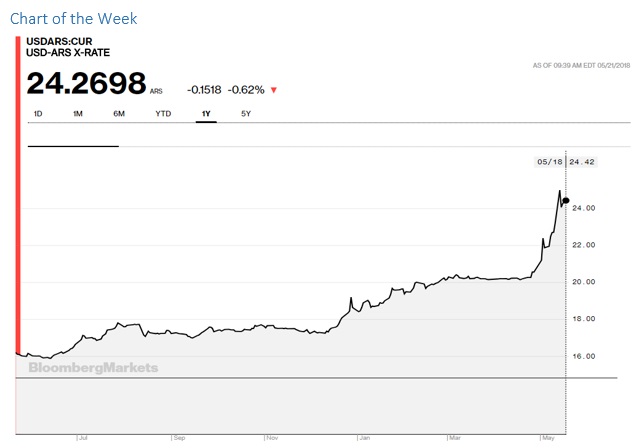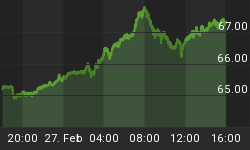Monday, May 21, 2018
U.S. suspends plans to impose trade tariffs on China. The Trump administration abruptly suspended its plans to slap painful tariffs on China, easing tensions between the two countries. Secretary of Treasury Steven Mnuchin cited progress in trade talks last week, with negotiations set to continue. “We’re putting the trade war on hold,” Mnuchin told Fox News on Sunday. Financial markets will welcome the news, but political pressure could mount on the administration to secure a favorable deal after months of aggressive talk. But analysts say the move could lock the U.S. into lengthy trade negotiations that have bogged down previous administrations.

(Click to enlarge)
- Argentina’s currency, the peso, has lost more than 40 percent of its value over the past year, plunging from 16 pesos to the dollar, to a 24:1 ratio.
- President Mauricio Macri has tried to implement pro-market reforms over the past few years, hoping to undo state intervention in the economy.
- But now he is in talks with the IMF over a bailout, which could reach up to $30 billion. The IMF is despised in Argentina, and any cooperation with the Fund will be politically perilous for the President.
Markets
IMF begins bailout negotiations with Argentina. Argentina is approaching a financial crisis, triggering negotiations with the IMF over a bailout. IMF managing director Christine Lagarde said “we fully endorse” a rescue of Argentina, and crucially, the U.S. government is not standing in the way. The Fund could offer Argentina a large credit line to help bridge any financing gaps, with payback required within 3-5 years. The Argentine peso has collapsed this year, which makes dollar-denominated debt vastly more difficult to pay back. The IMF has promised not to attach strings to the financial rescue package. Related: The Five Most Important Market Indicators
EU initiates “blocking statute” to protect European companies from U.S. sanctions. The EU took initial steps on Friday to revive the “blocking statute,” legislation proposed in the 1990s to avoid the U.S. sanctions on Cuba. The measure will bar European companies from complying with the penalties related to U.S. sanctions on Iran, and it would also offer compensation to affected European companies, although it is unclear if the move will be sufficient in mitigate the damage to European companies working with Iran. The legislation, which represents a major rift between the U.S. and the EU, could go into effect ahead of the finalization of U.S. sanctions in August.
Emerging market growth could slow dramatically. Recent data suggests that emerging market growth could slow to a crawl later this year, posing a headwind to the global economy. Growth in EM exports could slow “markedly” from 6 percent year-on-year in the first quarter to just 1 percent in the third quarter, according to Capital Economics. “The latest surveys have deteriorated quite markedly and there is some early evidence in the most recent hard data that we are seeing a slowdown in EM export growth,” said Liam Carson, emerging Europe economist at Capital Economics.
Commodities
Commodities win if Trump trade war put on ice. The escalating trade war between the U.S. and China threatened to take down a wide range of commodities, but the sudden thaw in the relationship could provide a jolt to the sector. The initial round of tariffs targeted steel and aluminum. China was set to retaliate with tariffs on U.S. soy, pork and corn. A long line of other Chinese products were targeted by subsequent announcements. Now, the latest progress includes a willingness by China to help reduce the U.S. trade deficit, could see higher Chinese purchases of U.S. agricultural products, LNG, ethanol or even crude oil. If the talks progress, commodities could see a boost to demand.
Three drivers for gold prices. Gold prices have shaved off 5 percent since last month, but the “fundamental case for holding” gold is still strong, says ING. “We look to physical demand, geopolitics, and inflation to provide support,” ING commodities strategist Oliver Nugent said in a note last week. “Things shouldn’t get much worse, but it will take time before we see improvement,” Nugent said. “We expect longer-term holders/consumers to build a floor for the yellow metal even if it remains shunned by active money managers hunting for more attractive near-term returns.”
Cobalt supply crunch biggest threat to EVs. Cobalt, a crucial ingredient used in the batteries in electric vehicles, could be the limiting factor for mass adoption of EVs. Cobalt prices have more than tripled in the past two years and enormous investments in new cobalt supplies will be needed to avoid a shortage, according to Bloomberg New Energy Finance. But because of the long lead times in bringing new mines online, a supply crunch could materialize in the early 2020s, BNEF says.
Energy
Iran wants EU to make euro-denominated oil purchases. Iran said that the European Union should purchase oil using euro-denominated oil contracts in order to help preserve the nuclear deal, which would help avoid U.S. sanctions. “With the withdrawal of America .... the European political support for the accord is not sufficient,” said Iran’s foreign minister Javad Zarif, according to state media. The statement comes after Total (NYSE: TOT), among other European companies, signaled their intent to end business ties with Iran if they are unable to avoid U.S. sanctions.
Trump admin could threaten sanctions on EU for Nord Stream 2. A German official told Bloomberg that the Trump administration raised the specter of U.S. sanctions if Europe moves forward with the Nord Stream 2 natural gas pipeline from Russia. “This is a further burden for the trans-Atlantic relationship,” Peter Beyer, a German envoy for trans-Atlantic relations said.
Related: Ethereum Blockchain Tops Bitcoin's In Latest Study
Venezuela’s President wins reelection…more sanctions loom. Venezuelan President Nicolas Maduro won reelection on Sunday in a vote widely seen as neither free nor fair. The U.S. had signaled that it would tighten sanctions if the government proceeded with the vote, although the economic crisis in the country is so bad that Washington could hold off for now. Either way, Venezuela’s oil production is in free-fall.
Cryptocurrencies
Bitcoin energy consumption soaring. The electricity used to “mine” Bitcoin has spiked in recent years and is estimated to have reached 2.55 gigawatts. But consumption is rising quickly, doubling roughly every six months. Electricity demand for Bitcoin could reach upwards of 8 GW as soon as this year, equivalent to the entire electricity consumption of Austria.
Bitcoin prices rebound after week of losses. Bitcoin rallied back to $8,500 by Monday, after dipping below $8,000 in recent days. Bitcoin had rallied between March and May, jumping from below $7,000 before peaking just shy of $10,000 earlier this month. But having failed to break through that resistance point, the cryptocurrency has been on a downswing. The losses temporarily came to a halt at the end of last week.
Colorado could accept political contributions in cryptocurrency. Colorado’s Secretary of State proposed new rules that would allow political contributions to come in the form of cryptocurrency. Anonymous donations would be capped at $20 but no maximum is set if it comes from identified people.
By Josh Owens for Safehaven.com
More Top Reads From Safehaven.com:
















